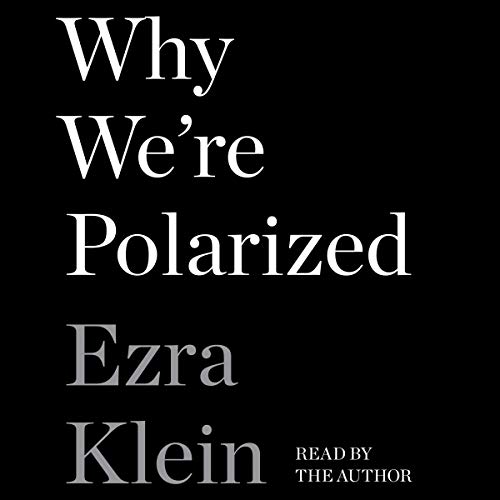Review of Why We’re Polarized by Ezra Klein
This is a great book – in particular the first 4 chapters explaining polarization. Klein cites numerous psychological studies on group behavior which are very enlightening. He describes many fascinating psychological studies on group behavior that explain why we support a party against our best interests, and how we argue differently to get a result we identify with. He believes polarization won’t end and suggests work-arounds including Ranked Choice Voting, being mindful of how articles appeal to our identity, instead of reason, and how we should focus on local politics, where we can make more of a difference, rather than national.Here are some highlights:
– Studies show people will get the right answer on a quiz, except when others in the group are planted to say the wrong answer is correct. We are influenced by others to reject our own reasoning. “Collectively, a group can know more and reason better than an individual, and thus human beings with the social and intellectual skills to pool knowledge had a survival advantage over those who didn’t. We are their descendants.”
– People vote against their self interest because they are voting to affirm their identity as Republican or Democrat. This identity is similar to being a fan of a particular sports team – it has nothing to do with whether the sports team benefits them. They just want their side to win. Sorting has mingled other identities with political identity to make it a much deeper identity. “A single vote can now indicate a person’s partisan preference as well as his or her religion, race, ethnicity, gender, neighborhood, and favorite grocery store.”
– People don’t like their own party as much as they hate the other party. It isn’t acceptable to hate other genders or races, but the other party is fair game. “The key idea here is “negative partisanship”: partisan behavior driven not by positive feelings toward the party you support but negative feelings toward the party you oppose.”
– Politicians behave more polarized to appeal to more polarized voters, which causes more polarized politicians, in a downward spiraling feedback cycle.
– Each party opposes things simply because the other party is for them. One of many examples in the book is the Obamacare individual mandate. It was proposed in 1989 by the Heritage Foundation, proposed by Republicans in Congress in 1993, and enacted by a Republican governor, Mitt Romney. But as soon as Democrats were in favor, every single Senate Republican voted for a point of order calling the individual mandate “unconstitutional.”
– One study showed partisans and articles about welfare. An article supporting more welfare was doctored to have Republicans endorsing it. An article for less welfare was doctored to have Democrats endorsing it. “For both liberal and conservative participants, the effect of reference group information overrode that of policy content. If their party endorsed it, liberals supported even a harsh welfare program, and conservatives supported even a lavish one.”
– Politics makes smart people stupid. “The least-engaged voters tend to look at politics through the lens of material self-interest (“ what will this policy do for me?”) while the most-engaged look at politics through the lens of identity (“ what does support for this policy position say about me?”).” “once group loyalties are engaged, you can’t change people’s minds by utterly refuting their arguments. Thinking is mostly just rationalization, mostly just a search for supporting evidence.” The more knowledgable people are, the better they are at this “motivated reasoning.”
– “The defining characteristic of our moment is that parties are weak while partisanship is strong.”
– American politics is responsive to two types of people: the polarized (small donors) and the rich (big donors). “Institutional donors are corrupting, small donors are polarizing.”
– All of this has eroded the power of party elites and amplified the power of primary voters, who are a much more polarized group than general election voters. And it has forced members of Congress, who mostly occupy safe seats, to pursue more polarized political strategies in order to keep themselves secure.
– “And if we can’t reverse polarization, as I suspect, then the path forward is clear: we need to reform the political system so it can function amid polarization.”
– “People have far more power to influence their mayor, state senator, or governor than they have to influence the president.”
– He lists multiple possible solutions to minimize the impact of polarization, such as: multi-member districts; ranked choice voting; ending the filibuster, making it easy to vote, not hard; eliminate the Hastert Rule (bipartisan bills aren’t voted on unless a majority of the majority party is in favor).

